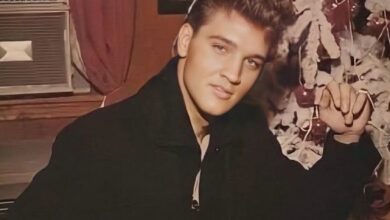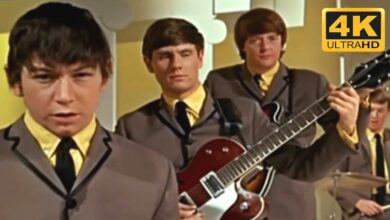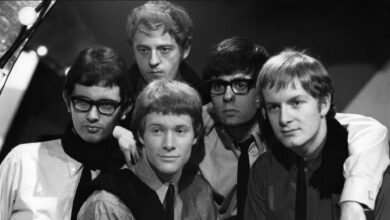Petula Clark’s “My Love” Conquers the Charts and Captures Hearts in 1966
Petula Clark’s “My Love” arrived in 1966 as a defining moment of the British Invasion, a tender yet resolute anthem that resonated deeply with listeners across the Atlantic. With its soaring melody and Clark’s unmistakable voice, the track became her second number-one hit on the Billboard Hot 100, reinforcing her position as one of the most successful female vocalists of the era. Beyond its commercial triumph, “My Love” encapsulated the optimism and romantic yearning that characterized the mid-1960s, securing a lasting legacy in popular music.
Before she conquered American airwaves, Petula Clark was already a celebrated performer in her native England. Having begun her career as a child star during World War II, she transitioned seamlessly into music, earning accolades across Europe. By the early 1960s, her collaborations with songwriter and producer Tony Hatch had propelled her to international fame. Hits like “Downtown” and “I Know a Place” exemplified her infectious blend of pop sophistication and heartfelt delivery, distinguishing her from other British contemporaries.
“My Love” emerged from Clark’s continued partnership with Hatch, who composed the track with her elegant vocal range in mind. Inspired by Clark’s expressive singing style, Hatch crafted a lush, orchestral arrangement that accentuated the song’s sentimental themes. The recording process took place in Los Angeles, with renowned session musicians contributing to the track’s polished sound. Clark herself brought an undeniable sincerity to the performance, capturing the essence of romantic devotion.
Upon its release, “My Love” swiftly climbed the charts, reaching number one on the Billboard Hot 100 in February 1966. Its success cemented Clark’s appeal in the American market, proving that her popularity extended far beyond the British Isles. The single also achieved notable rankings across Europe, further solidifying her status as a global pop sensation. Critics praised Clark’s emotive delivery and the song’s elegant production, lauding it as a standout in her growing discography.
Culturally, “My Love” exemplified the transatlantic exchange that defined the British Invasion. While many of her contemporaries adopted a grittier, rock-oriented sound, Clark’s sophisticated brand of pop maintained a timeless appeal. Her ability to connect with American audiences highlighted the evolving landscape of popular music, where international acts found immense success on both sides of the ocean. The song also underscored the growing prominence of female artists in a male-dominated industry.
For Clark, “My Love” marked a significant milestone in her career. The track’s success led to numerous television appearances, including memorable performances on “The Ed Sullivan Show” and “The Hollywood Palace.” It also expanded her opportunities in film and stage, showcasing her versatility as an entertainer. Throughout the 1960s, Clark continued to chart hits and build a loyal fan base, earning accolades that affirmed her lasting impact on popular culture.
The influence of “My Love” extended beyond Clark’s own career. Its sweeping orchestration and earnest lyrics inspired countless artists within the easy-listening and pop genres. Notable performers, including Connie Francis and Nancy Sinatra, praised Clark’s distinctive sound, often citing her as a key influence. Additionally, the song’s lush arrangement exemplified the sophisticated production techniques that would later shape the adult contemporary format.
Several artists have covered “My Love” over the decades, though few have matched the emotional resonance of Clark’s original rendition. Her ability to convey vulnerability and strength simultaneously remains one of the song’s defining qualities. While covers often brought new interpretations, Clark’s interpretation is widely regarded as the definitive version, standing as a testament to her interpretive brilliance.
At the time of the song’s release, Clark was navigating personal and professional growth. Balancing her career with her family life, she often reflected on the challenges of maintaining success in the fast-paced music industry. Yet “My Love” offered her a moment of triumph — a reaffirmation of her enduring appeal and artistic talent. This achievement further solidified her legacy as one of the premier vocalists of the 1960s.
Decades later, “My Love” remains a staple on oldies radio stations and classic pop playlists. Its inclusion in various retrospective compilations and film soundtracks continues to introduce new audiences to Clark’s timeless sound. In particular, the track is celebrated as a quintessential example of the British Invasion’s softer, more melodic side, distinguishing itself from the era’s edgier rock anthems.
Clark’s recording also influenced the future of pop balladry, paving the way for artists who sought to blend emotional storytelling with grand, orchestral instrumentation. Its enduring popularity demonstrates the universal appeal of heartfelt expression in music — a quality that transcends generations. The song’s success also encouraged producers to prioritize polished, layered soundscapes, foreshadowing the lush productions of the 1970s.
In the years since its release, Petula Clark has continued to receive honors recognizing her contributions to music. From lifetime achievement awards to prestigious stage appearances, her career remains a testament to her immense talent and determination. “My Love,” in particular, stands as a defining moment — a song that not only captured the spirit of its time but also carved out a permanent place in the history of popular music.
Reflecting on its legacy, it’s clear why “My Love” continues to resonate with listeners today. Its heartfelt lyrics and elegant melody evoke the tender emotions of falling in love, while Clark’s impassioned performance ensures its lasting impact. For fans of classic pop, the song serves as both a nostalgic touchstone and a reminder of the era’s remarkable musical achievements.



